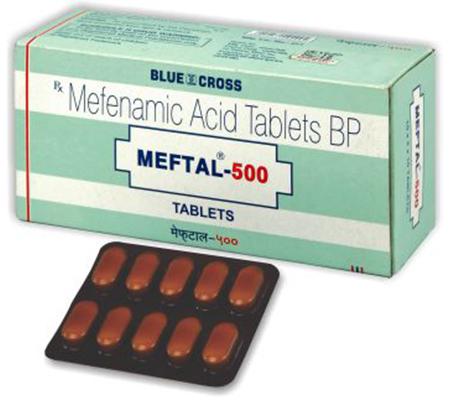Meftal (Mefenamic Acid) is a non-steroidal anti-inflammatory drug (NSAID) used to treat mild to moderate pain associated with inflammation. Meftal prevents the action of enzymes in the body that cause pain and swelling to prevent inflammation and pain. This makes it useful for treating minor injuries, fever, sprains, or minor pain. Your doctor may also recommend the medication for the treatment of other unlisted conditions.
Meftal is normally prescribed to be taken one to four times each day at a dosage of one tablet. Your particular directions will be determined by your doctor based on your age, weight, current health, the condition being treated, and the severity of your symptoms. These should be swallowed with a large glass of water and may be taken on an empty stomach, although a snack or meal is recommended before use if you experience nausea. Do not chew or split the tablets before use to avoid unintentionally destroying or altering the effects of their contents. Ask your doctor any questions you have about using the medication to ensure the correct administration.
Meftal may cause side effects in some patients such as: headaches, dizziness or drowsiness, dry mouth, bloating, gassiness, or heartburn, upset stomach, diarrhea, or constipation, mild skin rash or irritation, blurry vision, tinnitus (ringing in the ears).
Serious side effects that may require emergency medical attention include fever, flu symptoms, chest pain, trouble breathing, sensitive skin, easier bruising, urinary retention, painful urination, darkened urine, discoloured stools, or jaundice. Inform your doctor as soon as any worrying symptoms appear to make sure the necessary changes are made to your dosage or application frequency to prevent more problems from occurring.
Meftal should not be used by patients who are pregnant, breastfeeding, lactose intolerant, allergic to NSAID medications, who have a bad reaction to similar treatments in the past, or who have severe heart failure, inflammatory bowel disease, an active peptic ulcer, perforation of the intestines, recurrent bleeding, severe kidney failure, or severe liver failure. Also inform your doctor if you have porphyrias, diabetes, epilepsy, heart failure, hypertension, cerebrovascular disease, ischaemic heart disease, high cholesterol, decreased liver function, decreased kidney function, a history of asthma, a history of allergies, systemic lupus, or if you are taking any anticoagulant medications. These conditions may require lower doses or reduced application frequency to prevent further health problems from occurring.
Strictly use Meftal as prescribed and follow all instructions provided by your doctor. Safe, suitable, and optimum dosage can vary and is dependent on the patient`s health and medical history, as well as the condition you are treating.
Meftal may not be safe or suitable for all patients. Always ensure your doctor is informed if you are pregnant or breastfeeding, using any other type of medication (including non-prescription medicine, vitamins, and supplements), as well as if you have any allergies, other illnesses, or pre-existing medication conditions.
Seek immediate medical attention or proceed to your nearest accident and emergency department if you suffer a hypersensitive or allergic reaction. Symptoms usually present during a reaction of this nature include difficulty breathing or swallowing, swelling of the limbs or face, tight chest, hives, and skin rashes.






